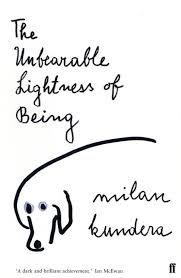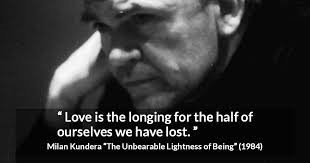The Unbearable Lightness Of Being
Author: Milan Kundera
Genre: Philosophical Fiction

Is it fiction – a story of a young woman in love with an incorrigible womanizer? Is it history – documenting Czech life during the soviet occupation? Is it a political treatise – showing how the high ideals of communism denigrated into hypocrisy? Or is it philosophy – deeply exploring relationships and the ideal way to live?
Well, it is all of the above, and that is what makes this a modern classic. Many believe Kundera, now 90, is an ideal candidate for Nobel prize for this book. He has won many other awards including most recently the Franz Kafka prize. Kundera was a Czech but lived most of his life in exile in France as his country was occupied by Soviet forces. He wrote many novels, this being perhaps the most famous, but also The Joke and The Book Of Laughter and Forgetting. I was drawn to him since two of my favourites – Alain de Botton and Shashi Tharoor – drew inspiration from him and recommended him highly as a non-English fiction author to must read (others obviously being Gabriel Garcia Marquez and Chinua Achebe, both reviewed in my blog).
The plot is enthralling. Tomas is a serial womanizer (he claims to have slept with “two hundred, give or take a few” women). To him commitment was heavy, lightness was freedom. His philosophy is that “Making love with a woman and sleeping with a woman are two separate passions, not merely different but opposite. Love does not make itself felt in the desire for copulation (a desire that extends to an infinite number of women) but in the desire for shared sleep (a desire limited to one woman).” He longed for multiple erotic encounters “not for pleasure (the pleasure came as an extra, a bonus) but for possession of the world…”. He wanted to see the individual ‘I’, the part that was unimaginable and lay hidden until a sexual encounter. He falls in love with Tereza but reflects that “his love for Tereza was beautiful, but it was also tiring: he had to constantly hide things from her… make amends…calm her down, give her evidence of his feelings…”. And so, “in spite of their love, they had made each other’s life a hell”.

Tomas and Tereza in the movie adaptation
Tereza is the quintessential lover and wife, completely loyal and wanting nothing but Tomas. But unable to share him with his mistresses. She suffers and tries to run away, but Tomas leaves everything to come after her for he realizes that “those years (with tereza) were more attractive in retrospect than they were when he was living them”. However, none is able to change themselves and the suffering continues. Meanwhile, Czech government becomes more and more authoritarian, silencing all intellectuals. Tomas, a famous surgeon, finds himself thrown out of his job because he dared criticize communism. And ends up washing windows. He actually is not upset because, along with the ‘lightness’ of reduced responsibilities, this gives him the opportunity to meet many young bored housewives!
The other interest in his life is Sabina, the very individualistic painter who cannot commit to a relationship, and shows an extreme ideal of freedom. She is an intellectual too with a heavy disdain for all forms of totalitarianism. “Behind Communism, Fascism, behind all occupations and invasions lurks a more basic, pervasive evil and that the image of that evil was a parade of people marching by with raised fists and shouting identical syllables in unison”. While she was referring to May Day parade, the larger image is not lost: when we expect everyone to comply with one standard of society, decay starts. Hence she is fiercely protective of her private space, turns down multiple suitors and stays alone till the end.
Kundera, ever the animal lover, weaves in the story of Karenin, the dog, who ultimately unites Tomas and Tereza. Kundera reflects why we find peace with our pets. “But most of all: No one can give anyone else the gift of the idyll; only an animal can do so, because only animals were not expelled from Paradise. The love between dog and man is idyllic. It knows no conflicts, no hair-raising scenes; it knows no development. Karenin surrounded Tereza and Tomas with a life based on repetition, and he expected the same from them.”

In between the story, Kundera drops in deep philosophical musings as a distant observer looking at what was happening and commenting on it. Many of these are laced with aphorisms: “the marriage bed is still the symbol of the marriage bond, and symbols, as we know, are inviolable”, or “the dead are as innocent as children. No matter how brutal life becomes, peace always reigns in the cemetery.” Or “And what can life be worth if the first rehearsal for life is life itself?”
Like a good fiction, the book also gives insights on what was happening in those times. How communism shrewdly appropriated the slogan “Long live Life” instead of “Long live Communism”, because then who could be opposed to it? There is a serious debate on whether or not we can claim innocence if we caused harm but did not know that we were causing harm. The story of Oedipus is intriguing: he unknowingly sleeps with the queen who happened to be his own mother. Because of this sacrilege, god sends plague and many of his subjects are killed. As penance, he gorges out his eyes and leaves Thebes. The question the author asks through Tomas is whether well-meaning communists, who genuinely believed in the socialist ideal (“I didn’t know! I was a believer!”), but still let the rape of Prague happen on Soviet hands, deserve punishment or not? After all, many “criminal regimes were made not by criminals but by enthusiasts convinced they had discovered the only road to paradise”. How true in today’s world with so many false leaders!
Along with the narrative chugs along Beethoven’s Muss es sein (Must it Be?) and Es muss sein (It must be). Kundera uses it as a motif to show how some of the most important choices in our lives are not really made out of free will. Love itself is often a string of coincidences which bring us close to an unknown individual and we end up taking it too seriously. Accepting the ‘lightness of being’ means accepting a certain lack of ultimate meaning in life, and living for momentary beauty. “Since everything interests him, nothing disappoints him”.

The Unbearable Lightness of Being is a difficult book. There is the author doing the narrative while being absent from the story. There are philosophical musings almost after every page, making the plot very fragmented. Nietzsche’s concept of eternal return itself is heavy and Milan’s counterpoint on “living only one life” is equally profound. The central motif of kitsch (meaning whatever is designed to appeal to the masses and devoid of high art) is striking but perhaps repetitive. The novel hardly follows any rules of fiction (there are multiple chapters on commonly misunderstood words that defines in pages after pages the deeper meaning of words like woman and cemetery). No wonder many readers have found the book over-rated.
Why Should You Read This book: For a beautiful and moving story… for a wide range of brilliant and stirring philosophical musings… for exposing the breath-taking inanities of life, which we otherwise take too seriously… for its wide breadth encompassing the extremes of comedy and tragedy… to know how absolute power corrupts and how once high ideals denigrate in reality. A serious reader will be forced to reassess his own life and attitudes, and that is much more than one can ask from a work of fiction.
Goodreads Link: The Unbearable Lightness of Being by Milan Kundera | Goodreads

 This information will never be shared with third party
This information will never be shared with third party
Post A Comment
Want to join the discussion?Feel free to contribute!